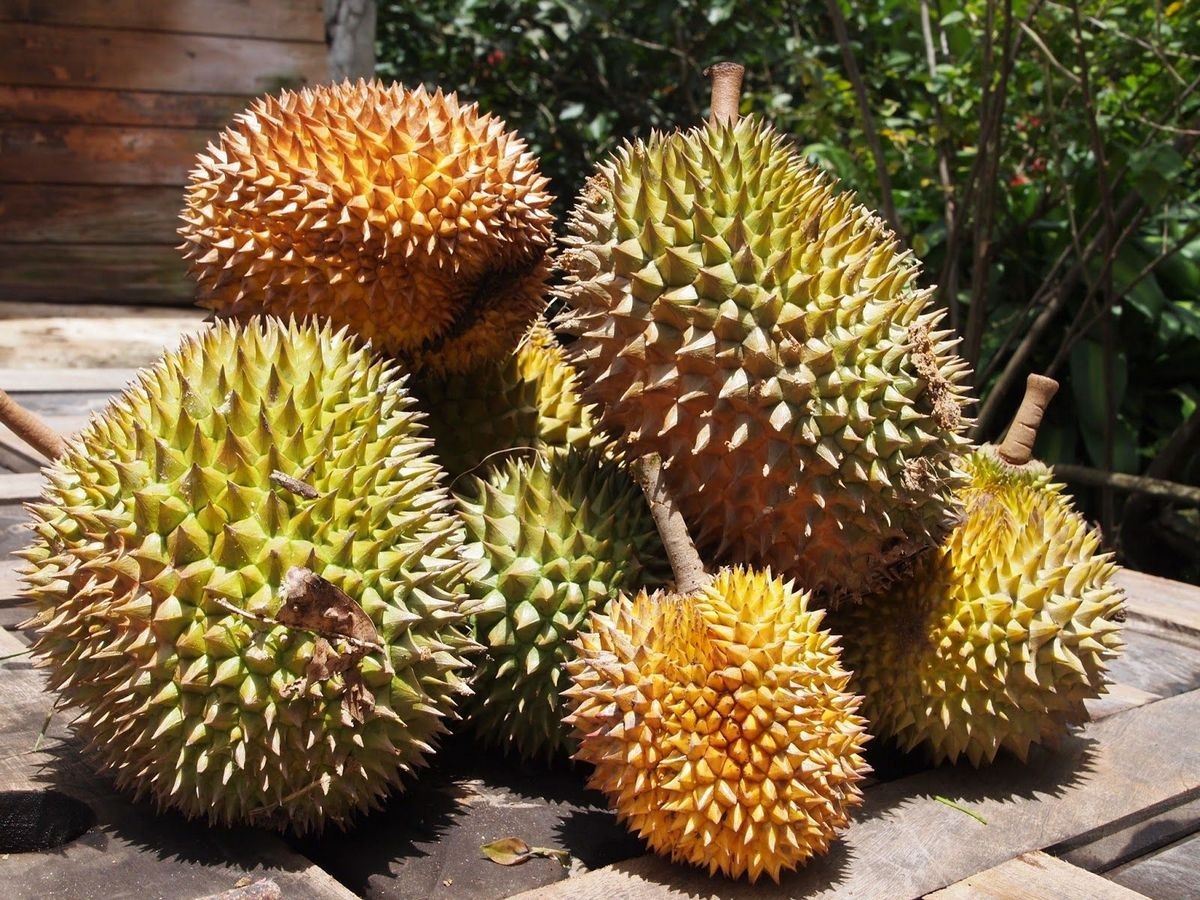
Contents
- 1 Durian Fruit: Potent Smell but Incredibly Nutritious
- 1.0.1 What is durian fruit?
- 1.0.2 How do you cut durian fruit?
- 1.0.3 What is peculiar about durian’s smell and taste?
- 1.0.4 What are the nutritional values of durian?
- 1.0.5 6 health benefits of durian
- 1.0.6 Are there any side effects associated with durian fruit?
- 1.0.7 Subscribe to MedicineNet’s Weight Loss/Healthy Living Newsletter
Durian Fruit: Potent Smell but Incredibly Nutritious
Durian offers health benefits, but has side effects when consumed unripe or in large quantities.
Despite its potent smell, durian is a popular delicacy in Southeast Asia. This odor is caused by sulfur compounds controlled by enzymes called methionine gamma lyases, abundant in the fruit.
- The creamy fruit is native to the Indonesian islands of Borneo and Sumatra, where over 30 species of durian trees grow, but only nine produce edible fruit.
- Only one durian fruit type, scientifically called Durio zibethinus, is commercially marketed worldwide.
What is durian fruit?
Durian is known as the king of fruits. It is notable for its massive size, pungent odor, and tough thorn-covered husk, named after the Malay word duri, meaning thorn.
The fruit can grow up to 40 cm long and 30 cm in diameter, weighing 1 to 5 kg.
Depending on the species:
- its form varies from oblong to circular,
- the color of its husk from green to brown, and
- the color of its flesh from pale-yellow to red.
The tough outer husk is coated with sharp thorns, and the custard-like flesh inside has a strong, unique odor. The seed can be consumed after boiling, drying, frying, or roasting.
How do you cut durian fruit?
The steps to cut the fruit are:
- Wear hand gloves to protect your hands.
- Use a sharp knife to cut the stem off the top of the fruit.
- Turn the fruit over and set it on a clean surface, stem side down.
- Make an incision on the top of the durian fruit with a knife through the thick skin. Pull the skin back slowly.
- Open the fruit completely.
- Remove the huge pods and seeds from the flesh before consuming or boiling it.
- Make delicious sweet treats with cut pieces of matured durian fruit.
What is peculiar about durian’s smell and taste?
For over a century, travel writers have attempted to describe the taste and smell of durian, but no one has come close. This is because no one has ever experienced such a unique flavor and scent.
Naturalists and food writers have compared the taste and smell to many things, such as:
- A rich custard with almonds
- Cream cheese
- Onion sauce
- Sherry wine
- Turpentine
- Stale vomit
- Civet cat
- Sewage
- Gym sock
QUESTION
What are the nutritional values of durian?
| Calories | 357 |
| Carbohydrates | 66 grams (24 percent of DV) |
| Total fat | 13 grams (17 percent of DV) |
| Fiber | 9.2 grams (33 percent of DV) |
| Protein | 3.6 grams (7 percent of DV) |
| Vitamin C | 47.9 mg (53 percent of DV) |
| Vitamin B6 | 0.768 mg (45 percent of DV) |
| Folate | 87.48 mcg |
| Potassium | 1,029 mg (23 percent of DV) |
| Copper | 0.50 mg (56 percent of DV) |
| Calcium | 15 mg (1 percent of DV) |
| Sodium | 4.9 mg (0 percent of DV) |
| Manganese | 0.790 mg (34 percent of DV) |
| Phosphorus | 94.77 mg (8 percent of DV) |
| Magnesium | 72.90 mg (17 percent of DV) |
| **DV = Daily Value | |
Durian also contains other nutrients:
6 health benefits of durian
Durian provides six health benefits:
- Aids with healthy weight gain:
- Durians are high in fats and carbs, making them an excellent choice for a healthy weight gain diet.
- Regularly eating durian will boost your calorie consumption and help you gain weight.
- Homemade durian cookies or durian ice cream are high-calorie healthy treats.
- If you are sensitive to the smell of this fruit, durian ice cream is a wonderful option because it keeps the flavor while decreasing the stench.
- Reduces the risk of cancer:
- Antioxidants in durian may reduce the risk of cancer.
- Polyphenols in the fruit inhibit the growth of cancer cells and even destroy them.
- By fighting free radicals, durian’s antioxidants may help reduce the risk of cancer.
- Strengthens the bones:
- Durian fruit is high in magnesium, potassium, and calcium.
- These minerals aid in the maintenance of healthy bones by preserving bone mass and increasing bone density.
- Consuming durian fruit daily improves bone mineral density in both men and women.
- May delay aging:
- Vitamin C in durian reduces pigmentation and increases collagen production.
- Antioxidants in durian reduce oxidative damage and slow down the aging process.
- Durian consumption may help minimize signs of premature aging, such as fine lines and wrinkles.
- Research suggests that antioxidants in durian can help minimize certain indicators of skin aging.
- Reduces the risk of heart diseases:
- Durian’s high potassium content is beneficial to blood circulation and heart health.
- Durian may have cholesterol-lowering properties.
- Durian may help reduce the risk of liver disorders caused by fat buildup in the liver.
- Regulates blood sugar levels:
- Durian has a low glycemic index, which helps control blood sugar levels.
- Durian’s high fiber content aids with carbohydrate digestion.
- Fiber slows the gut absorption of sugars, inhibiting a surge in blood sugar levels.
- Consumption of durian increases insulin levels, aiding in the maintenance of blood glucose levels.
- Eating durian can increase glucose metabolism in the body.
Are there any side effects associated with durian fruit?
Durian has certain downsides when consumed unripe or in large quantities. Some people who are allergic to durian experience allergic responses.
In some cases, durian is not easily digested, resulting in digestive issues such as abdominal discomfort and stomach cramps.
Consuming durian with alcohol might cause nausea and vomiting due to the fruit’s sulfur-like chemicals. It is best to avoid eating durian and drinking alcohol at the same time.
People with serious gastrointestinal disorders and kidney troubles should avoid eating durian because it might increase toxins in the body and cause diarrhea. Consuming durian seeds can cause breathlessness.
When eating or preparing durian, use only fresh food that shows no signs of damage or rotting to avoid any health risks.
Due to its powerful and unpleasant smell, durian is prohibited at several airports and hotels. There are additional restrictions on the long-distance movement and storage of this tropical fruit.
Subscribe to MedicineNet’s Weight Loss/Healthy Living Newsletter
By clicking "Submit," I agree to the MedicineNet Terms and Conditions and Privacy Policy. I also agree to receive emails from MedicineNet and I understand that I may opt out of MedicineNet subscriptions at any time.
By clicking "Submit," I agree to the MedicineNet Terms and Conditions and Privacy Policy. I also agree to receive emails from MedicineNet and I understand that I may opt out of MedicineNet subscriptions at any time.


